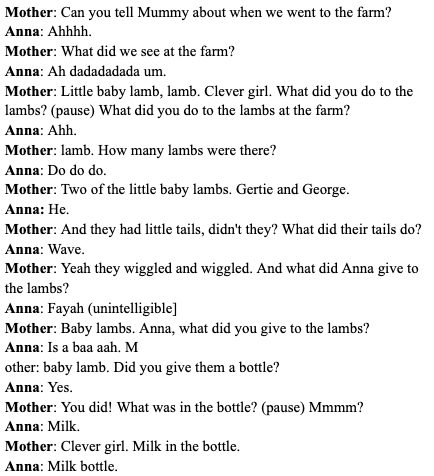Child Development
One Crucial Way to Boost Adolescent Well-Being
It may start by how we converse with them during toddlerhood.
Posted May 30, 2022 Reviewed by Vanessa Lancaster
Key points
- Elaborative reminiscing entails encouraging children to talk about past events, their role in them, and how they felt about them.
- Keys to elaborative reminiscing follow a child’s interest in the conversation and praise their responses.
- Teens that engaged in elaborative reminiscing during toddlerhood showed more insight into difficult life events.
Each of us has a story about who we are, the various event and persons who’ve influenced us, and what actions we’ve taken to get ourselves where we are.
These are our narrative identities—and research shows that the more structurally coherent, meaningful, and agentic (or full of a sense that we’ve had the ability to influence our circumstances) they are, the greater our well-being is likely to be.

Knowing this, New Zealand researchers Claire Mitchell and Elaine Reese at the University of Otago, Dunedin, sought to examine adolescents’ narrative identity formation and its effects on their well-being.
Specifically, Mitchell and Reese wanted to understand better how parental communication styles during a child’s earliest years influence that child’s narrative identity construction—and what effects this has on a child’s psychological functioning once they enter their teenage years.
The Studies
In the late 1990s, Mitchell and Reese recruited 115 mothers and their toddlers to participate in a home-based study. Researchers observed how mothers conversed with their toddlers, then assigned some mothers to an intervention group where they were taught elaborative reminiscing—essentially, encouraging children to talk about something that’s happened, their role in it, how they felt about it, and what it means to them through open and responsive conversation.
Other mothers in a control group were not given special instruction in reminiscing. "Keys to elaborative reminiscing are following a child’s interest in the conversation and praising their responses are key to the process," Reese explained in an email interview.

Mother-child pairs were then visited periodically over the next year so that researchers could assess children’s language and nonverbal memory skill development; then again at one year, two years, and about ten years after for the same evaluations.
Ninety-three children from these original studies partook in another follow-up study once they turned 15—one that assessed how their mother’s elaborative reminiscing during their toddlerhood impacted their adolescent well-being. The teens completed a Life Story Interview, in which they discussed chapters of their lives and a life-changing event, as well as event specifics (who was there, what happened, how everyone involved felt, etc.) and how the event changed them.
This enabled researchers to assess the teens’ insight: Greater insight was indicated when they extracted meaning from events and clearly described how events changed them (e.g., “The death of my grandma made me realize people aren’t here on earth forever and I should spend more time with people I love”).
Lower levels, by vaguer meaning extractions that lacked specifics (e.g., “It made me happier”) or (“I learned I should be more careful”). Participants also completed personality trait assessments measuring their extraversion, agreeableness, conscientiousness, neuroticism, and openness to experience; a self-esteem assessment; two measures assessing their well-being (the Strengths and Difficulties Questionnaire Self-Report (SDQ-YSR) and the Center for Epidemiologic Studies Depression Scale (CESD), and a life satisfaction survey (Satisfaction With Life Scale (SWLS)).
Mitchell and Reese found that teens whose mothers engaged them in elaborative reminiscing during their toddlerhood showed more insight into difficult life events and reported better well-being than teens whose mothers were in the control group.
How Elaborative Reminiscing Aids Wellbeing
In an email interview, Reese pointed out that “the main way elaborative reminiscing helps adolescents’ mental health is through open and sensitive conversations with parents about difficult past events in particular.”
While her and Mitchell’s intervention didn’t specifically target negative past events, their later follow-up showed “that the mothers in the intervention group transferred their elaborative reminiscing skills later on to negative past events.”
Other research, she added, “shows that elaborative reminiscing specifically about negative events helps young children’s emotion understanding, which in turn is linked to their mental health as adolescents.”
Importantly, the greater expression of negative emotions in conversation “indicates more advanced emotion skills and also comfort at disclosing negative emotions with their mothers,” which helps explain why children whose mothers engaged them in elaborative reminiscing fared better emotionally than children with less elaborative reminiscing engagement.

Being able to label emotions (particularly negative ones) in early childhood has been found to aid adolescents in emotion regulation and improve their impulse control and social problem-solving abilities.
Discussing past negative emotions can also aid self-understanding and boost well-being, other researchers suggest, by helping children healthily distance themselves from such emotions (so that they’re no longer in those emotions’ throes).
What’s more, as Mitchell and Reese write in the Journal of Personality, “mothers' elaborative reminiscing supports children to develop more complete, specific, and accurate memories of early childhood experiences, which in turn could offer older children and adolescents a richer store of memories to draw upon when forming their narrative identities.”
This is a compelling finding underscoring the importance of engaging children in conversation at early ages, following their lead in conversation, and encouraging them to elaborate on the thoughts, feelings, and experiences they encounter at home, school, and in the world at large.
And parents aren’t the only people who can help children with this critical skill, Reese stated. Teachers, grandparents, and other family friends and relatives can engage children in the practice of elaborative reminiscing, too.
The earlier we start teaching our children how to make sense of internal and external events, label their emotions, and situate their experiences in an ongoing narrative of who they are and how they fit into the world, the more adept we help them become at understanding their realities and coping with the inevitable challenges life puts in their paths.
References
Mitchell, C., & Reese, E. (2022). Growing memories: Coaching mothers in elaborative reminiscing with toddlers benefits adolescents' turning-point narratives and wellbeing. Journal of Personality. Advance online publication. https://pubmed.ncbi.nlm.nih.gov/35067939/




